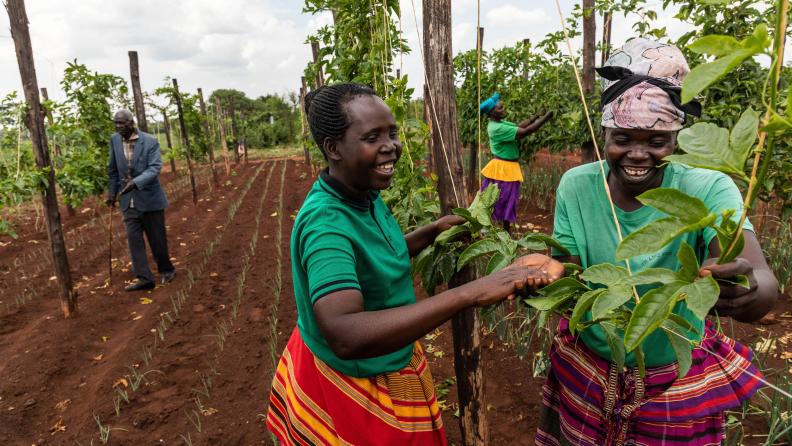
About the project
The ACAMI project addressed a lack of recognition of the role of meso-level organizations (MLOs) in enabling transformative, locally-led climate change adaptation. In a two-year initiative ACAMI identified leverage points and bottlenecks affecting the capacity of MLOs to facilitate equitable and effective adaptation for small-scale producers. By co-creating tools and metrics that capture the attributes and strategies of MLOs, the project supports partnership opportunities and improves risk management and sustainable livelihoods under climate change.

Meso Level Organizations (MLOs) [working definition]:
We refer to MLOs as organizations that are involved in implementing climate change adaptation (CCA) projects/ interventions intended to benefit agricultural small scale producers (SSPs). These can be private or public sector organizations and they may range in terms of their level of formality (e.g. local community based organizations (CBO) vs. an international non-government (NGO) vs. a private sector service provider). They are connected in networks of complementary skills and experiences to carry out the intentions of investment projects and policy. What is common among these organizations is that they play an intermediary role between the SSPs (micro level) and the policy, scientific and finance communities (macro-level). They therefore hold specific expertise and experience in the practical challenges of climate change adaptation. We are particularly interested in those MLOs that work in close proximity with SSPs and are therefore able to understand their needs, values and priorities while at the same time are also engaged with the agendas and stipulations of funding agencies and sponsoring organizations. We argue that these organizations and the connections among them have a potentially enormous impact on farmers and farming communities through the knowledge they integrate, decisions they make, and resources they provide.
Vision and Mission
ACAMI envisions a transformed institutional context for inclusive and effective adaptation in African small-scale farming systems, in which “Meso-level” Organizations – connecting financial sponsors and policy makers to farmers -- use and share knowledge on their capacities and strengths in novel partnerships, helping farmers access the knowledge, data, climate services, and other resources they value for improved risk management and sustainable livelihoods under climate change.
ACAMI’s mission is to identify leverage points and bottlenecks to enable Meso-level Organizations to serve as catalysts of equitable and effective adaptation for small-scale African producers. Through collaborative approaches, ACAMI integrates knowledge and develops decision-support tools that will facilitate the mobilization of Meso-level Organizations’ capacities, thus enhancing communities of practice in relation to resilient and sustainable small-scale farming systems.
Project Objectives
- Understand how Meso-level Organizations influence the effectiveness, sustainability, and scaling of climate change adaptation
- Identify what might enhance the ability of Meso-level Organizations to exercise full capacities in climate change adaptation
- Co-create tools, and metrics that capture Meso-level Organizations attributes and capacities to support partnership opportunities in climate change adaptation
Project Location
To capture the contextual diversity of agricultural small-scale producers and climate adaptation initiatives in Africa, ACAMI focuses on four African Countries, namely Ghana, Kenya, Malawi, and South Africa.

ACAMI’s Approach to Making the Meso-Level Visible

ACAMI Knowledge Series
Other Outputs
Recording for the 1st ACAMI convening: Organizations and Partnerships in Climate Change Adaptation Projects for Agricultural Small-Scale Producers (5 July 2023) - Watch the full recording here
Summary Report for the 2nd ACAMI convening: Gender and Beyond: Creating Innovative Strategies for Inclusive Climate Change Adaptation among Small-Scale Producers in Africa (15 Feb 2024)
Convening Brief for the 2nd ACAMI convening: Gender and Beyond: Creating Innovative Strategies for Inclusive Climate Change Adaptation among Small-Scale Producers in Africa (15 Feb. 2024)
Partners and Funders


ASU Julie Anne Wrigley Global Futures Laboratory
ASU Swette Center for Sustainable Food Systems
This project, funded (in part) by a $1.25 million grant to ASU from the Bill & Melinda Gates Foundation looks at the ways in which organizations help African farmers adapt to Climate Change. The findings and conclusions contained within are those of the authors and do not necessarily reflect positions or policies of the Bill & Melinda Gates Foundation.
Advisory Board
Dr Sélim Louafi (CIRAD), Sarshen Scorgie (Conservation South Africa), Ishmael Sunga (SACAU), Dr Mark Tadross, Dr Katharine Vincent (Kulima)
Research Team

PI: Prof Eric Welch (Arizona State University)
Co-PI: Prof. Hallie Eakin (Arizona State University) -
Project coordinator and contact person: Dr Nadine Methner (ACDI), +27 (0)79 2829316
Project team:
Awula Abby Apuryinga (Ghana)
Dr Darlington Sibanda (ACDI)
Dr Ekua Semuah Odoom (ACDI)
Prof Eric Welch (ASU)
Prof Hallie Eakin (ASU)
Jinghuan Ma (ASU)
Dr Joanes Atela (ARIN)
Prof Mark New (ACDI)
Prof Mauricio Bellon Corrales (ASU)
Dr Nadine Methner (ACDI)
Dr Ruth Magreta (LUANAR)
Prof Tim Johnson (UIC)
Washington Kanyangi (ARIN)
Dr Yamini Yogya











